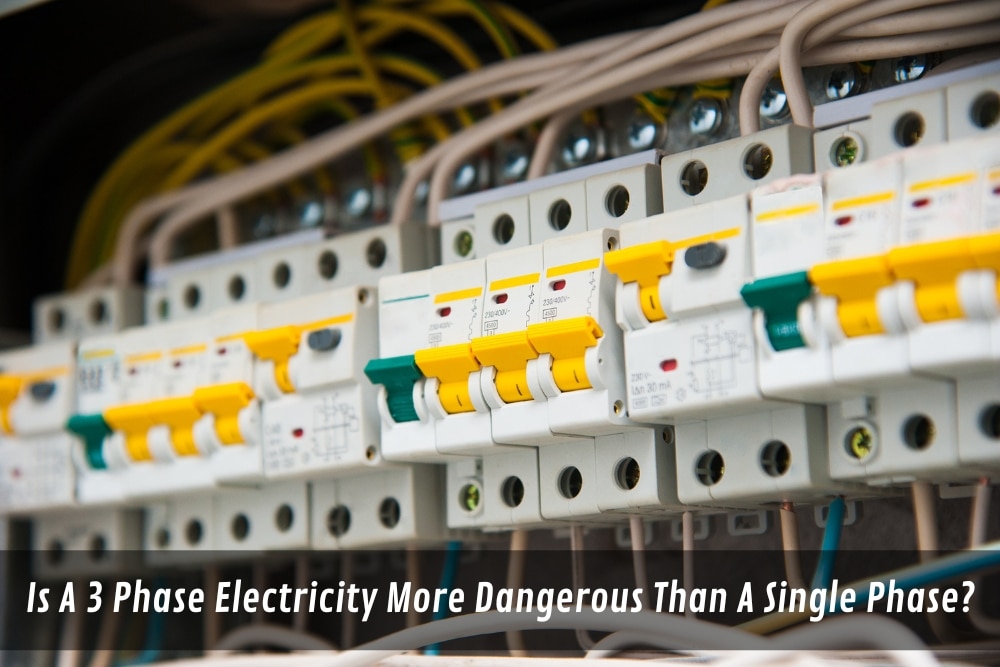Is A 3 Phase Electricity More Dangerous Than A Single Phase?
If you are an electrician or someone who deals with electricity, you may have come across the term “3-phase electric board”. This type of power distribution system is commonly used in industrial settings to power heavy machinery and equipment. However, there is a common misconception that 3 phase electricity is more dangerous than single-phase electricity.
In this blog post, we will explore this topic and determine whether there is any truth to this claim. We will also discuss the differences between single-phase and 3 phase electricity and the safety considerations that need to be taken into account when working with these systems. So, let’s dive in and separate the facts from the myths when it comes to 3 phase electricity.
What is a 3-phase electric board?
A three-phase electric board is an arrangement of power distribution boards and components that are designed to provide electrical power for industrial, commercial, or residential buildings and applications. It consists of a three-phase power supply, which produces three alternating currents (AC) of different frequencies, which are phase shifted by 120 degrees. This allows the three-phase system to produce more power than a single-phase system at the same voltage.
What is a single-phase electric board?
A single-phase electric board is an arrangement of power distribution boards and components that are designed to provide electrical power for residential and commercial buildings or applications. It consists of a single-phase power supply, which produces one AC current with a fixed frequency. This system is typically used in low-voltage systems such as households, small businesses, and other areas where the amount of power needed is not too high.
Unlike three-phase systems, single-phase systems do not require additional equipment or wiring to generate electricity. They only need one transformer and a few wires. Single-phase systems are also easier to install than three-phase systems since there is less complexity involved. However, the downside to single-phase systems is that they cannot produce as much power as three-phase systems.
What is the distinction between single-phase and 3 phase electric boards?
Single-phase electric boards are essentially the most common type of electrical system. These systems consist of single-phase power, usually from a utility company, as well as one returning path for the electricity to travel back to the source. This type of system is often used in residential and small commercial settings.
On the other hand, three-phase boards provide multiple sources of power and several returning paths which allow more power to be delivered at higher levels while also providing smoother power delivery. This makes them ideal for large industrial applications where more power is needed and the quality of the final product must be checked more carefully. It should also be noted that due to their complexity, 3-phase electric boards require a much higher level of skill and experience to install and support than single-phase systems.
What measures can be taken to guarantee safety when using both kinds of electric boards?
Whether you are working with a 63 amp 3-phase electric board or a single-phase electric board, safety should always be a top priority. Here are some measures that can be taken to ensure the safe usage of both types of electric boards:
- Proper Training: Anyone who works with electricity should be properly trained and certified. This includes understanding the basics of electrical systems, wiring, and safety procedures.
- Regular Maintenance: Both single-phase and 3-phase electric boards should be regularly maintained to ensure they are in good working condition. This includes checking for any signs of wear and tear, loose connections, or other potential hazards.
- Personal Protective Equipment (PPE): Those working with electricity should always wear appropriate PPE. Such as insulated gloves, safety glasses, and fire-resistant clothing.
- Circuit Breakers: Both electric boards should be equipped with circuit breakers to prevent overload and short circuits. These should be regularly checked and tested.
- Grounding: Proper grounding is critical to prevent electrical shock and other hazards. Both types of electric boards should be properly grounded and bonded.
- Lockout/Tagout Procedures: Whenever maintenance or repairs are required, proper lockout/tagout procedures should be followed. This is to prevent accidental energising of the system.
By following these measures, you can ensure the safe usage of both single-phase and 3 phase electric boards. Remember, electricity can be dangerous, but with proper precautions, accidents can be prevented.
Conclusion
Overall, three-phase electricity is more powerful and complex than single-phase electricity, which can make it more dangerous if handled incorrectly. For this reason, it is important to take the appropriate safety measures when using either type of electric board. With the right knowledge and tools, both single and 3-phase electric boards can be safely installed and maintained.
At Electrability, we take safety seriously. That’s why we provide quality-checked 3-phase power systems and switchboards to ensure that our customers have the best possible experience. Our team of experienced electricians are always on hand to help with any questions or queries you may have. We can also install 3-phase power systems, as well as provide guidance and advice on safely installing, operating and maintaining your electric board. Contact us today for more information about our services!

